5 Best AI Research Tools for 2025
Streamline Your Research Process with AI
Promising advancements in AI have been released in research, with new instruments aimed at making research more effective, efficient, and intelligent. It is expected that over the next five years, AI tools and research shall predominate in academic, corporate, and market research areas. These tools enable the researchers not only to collect and analyze data, but also enhance the quality of findings drawn from data. This guide looks into the tools that are likely to dominate the AI research domain in 2025 and how this evolution is likely to shape the future of the field.
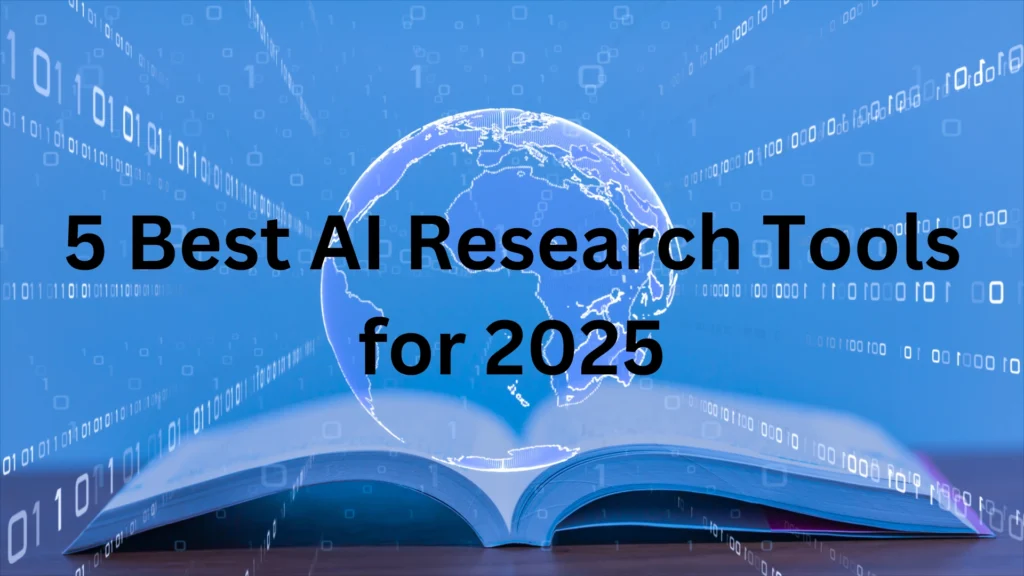
Below is a compilation of AI tools for market research, AI research tools for literature review, and AI tools for research paper writing, that will help you be successful in literature reviews, data analysis, and writing.
1. SciSpace: The All-in-One Tool for Researchers
SciSpace, formerly known as Typeset, has quickly become one of the most sophisticated yet best AI tools for research, helping academics and professionals with their research. In addition to citation and literature management, SciSpace also aids in the assimilation and categorization of the organization of research tasks.
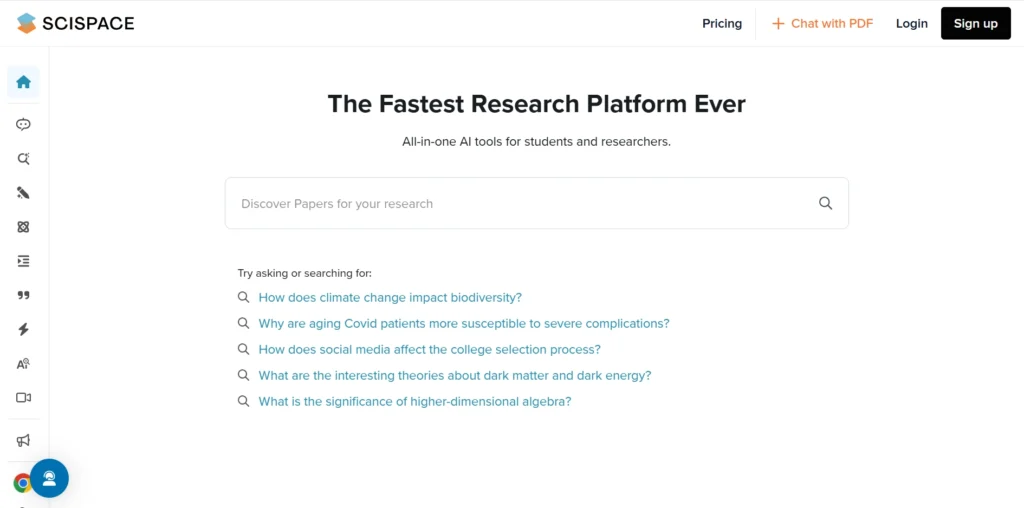
Key Features:
- Comprehensive Literature Reviews: To facilitate a comprehensive literature search, SciSpace leverages the power of an AI. Using your topic, the AI can search through millions of published papers to compile relevant articles and keywords or even suggest seminal works or the latest trends in the given field.
- AI-Powered Writing Support: The AI Writer tool of SciSpace helps researchers define the structure of research papers right from drafting to producing meaningful and persuasive writing. It offers structuring tips and corrects or rephrases the text, making writing more manageable for both L1 and L2 learners.
- Smart Citation Management: Say goodbye to the tediousness of writing citations manually. SciSpace also helps in citation formatting and provides different citation styles including APA, MLA, Chicago citation styles, and more.
- Data Visualization: The tool also assists in developing basic yet impactful displays of information, so the data in a paper is presentable and clean.
Pricing:
SciSpace has Basic, Premium, Labs and University plans; however, the former is entirely free and gives access to the essential features. To enable additional offerings such as superior AI writing assistance and literature review options, the Premium plan, costs around $12/month, and for Universities, it is $8/month only. For more information on pricing, visit here.
Why Choose SciSpace?
SciSpace is an AI tool for writing research papers and is perfect for users who are tired of having to switch between multiple platforms or tools to get all their academic needs met, from reviewing the state of literature to finalizing their papers. It has a simple design, so even people who are not very tech-savvy can use it, and owing to AI features, users can work with the data rather than employing many different formatting or manual search options.
2. Elicit: The Machine Learning-Based Approach for Improved Literature Review
From experience, defining a search question involves going through hundreds if not thousands of studies, which could be very exhaustive. Elicit alters the game of the literature review process in such a way that a researcher can easily identify relevant papers and articles.
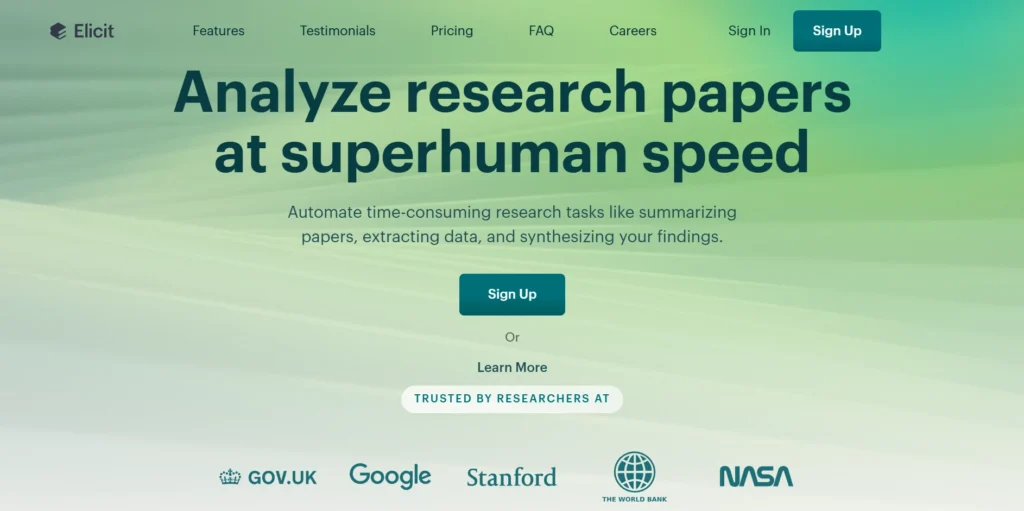
Key Features:
- Intelligent Literature Search: Basically, Elicit AI will be able to search for articles in the database using specific questions or keywords entered. Unlike common search engines, it searches scholarly databases and excludes non-relevant or low-quality papers from the results list.
- Data Extraction and Summarization: Another thing that has been found very useful in Elicit is the fact that it can in fact help extract details from papers in a faster manner. For instance, it can extract study characteristics, results, methodologies, and key findings in minutes, thus saving time for reading.
- Question Answering: It enables users to formulate particular research questions and on the data it extracted from its own derived sources, make conclusions. This feature is quite useful for hypothesis generation and also for comprehension of the existing knowledge in a given subject area.
Pricing:
Elicit has a Basic, Plus and Pro plan, with prices, $0/month with essential features, $10/month for deeper research, and $42 for systematic reviews, respectively. To learn more about their pricing, visit here.
Why Choose Elicit?
As such, Elicit is a great tool for anyone who has to do many literature reviews because it does a lot of the boring part for you. It is particularly helpful for newcomers in their line of research to drown in the sea of articles since it provides them with core, genre-related literature.
3. Research Rabbit: In-Depth Exploration with the Help of Visuals
Using this kind of technology Research Rabbit is bringing about a revolution in how researchers overcome the limitation of visualizing links between more studies. Instead of offering lists of text-based related documents, it offers nodes and links that give the researcher an idea of how papers, topics, and authors are connected.
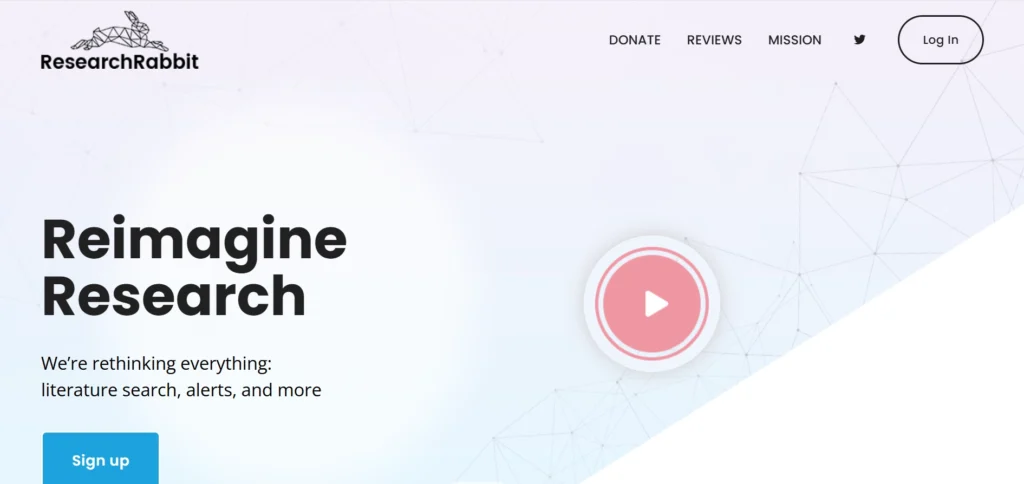
Key Features:
- Visual Knowledge Mapping: Using Research Rabbit, one is able to generate live links, which connect works, writers, and themes in a research work. It is helpful to observe how studies connect or differ in some areas, which is very useful for literature reviews and brainstorming.
- Intelligent Recommendations: If you want the search to be a bit broader based on your current interests Research Rabbit offers suggestions for related papers that could help you add to your list with little to no effort.
- Collaboration-Friendly Interface: To some extent, you can share your research maps with others which is useful particularly when developing research undertakings or syncing on techniques for literature reviews amongst various teams.
Pricing:
Since Research Rabbit is free of charge, it should come in handy to any students, academics, and teams who rely on visual assistance in the course of research.
Why Choose Research Rabbit?
When it comes to the visualization of research relationships, Research Rabbit stands out in peculiar ways. This is useful for people when they need a brief overview of a particular field and a tool to recognize important relationships immediately. In teamwork, the map-sharing feature is highly useful for coordinating and driving consensus on what each member or team wants.
4. Consensus: The AI-Driven Search Engine for Evidence-Based Research
Consensus is a specialized AI-powered search engine focused on providing researchers with evidence-based answers. It directly extracts findings from scientific literature, making it a go-to tool for quick and accurate research insights.
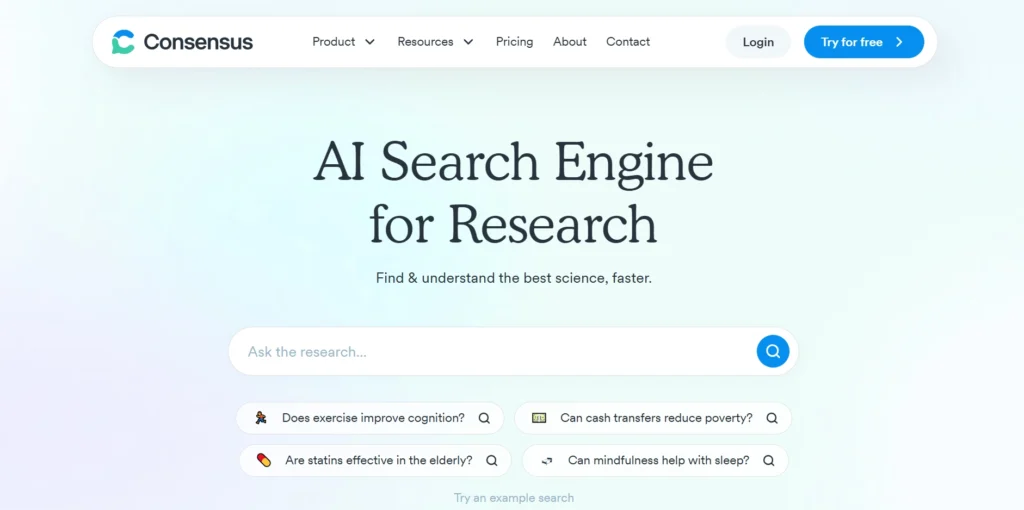
Key Features:
- Claim Extraction and Verification: Consensus goes beyond keyword matching; it actually identifies specific claims made in research articles. For example, if you’re researching the effects of a specific diet on heart health, Consensus can find studies supporting or refuting those claims.
- Evidence-Based Summaries: Each query results in a summary of evidence supporting or opposing claims, making it easier to see where the consensus in a field lies.
- Transparency with Source Linking: Every claim is linked directly to its original source, allowing researchers to validate findings quickly and assess the credibility of the research.
Pricing:
Consensus has a free version but has a premium plan with premium features for advanced search and summarization starting at $8.99 per month. On top of that, it has a Teams plan for research organizations, starting from $9.99 per seat per month, and an Enterprise plan that is custom to your requirements. For more information, visit here.
Why Choose Consensus?
Consensus is excellent for researchers who need reliable, evidence-backed information quickly. It’s perfect for systematic reviews, meta-analyses, and any situation where you need to verify claims with high confidence. With its focus on evidence and transparency, Consensus is a standout tool for those prioritizing factual accuracy.
5. Trinka: Specialized AI Writing Assistant for Academic Work
Unlike general writing tools, Trinka was developed specifically with researchers in mind. It offers grammar and style improvements that cater to academic and technical language, ensuring that your writing is not only correct but also suited to the norms of academic publication.

Key Features:
- Grammar, Style, and Phrasing Checks: Trinka goes beyond basic grammar correction. It provides suggestions for phrasing that make your writing clearer and more precise, which is especially useful for research papers.
- Consistency Checks: Trinka ensures that terminology, abbreviations, and formatting remain consistent throughout the document. This feature alone can save hours of editing, particularly in long, complex research papers.
- Technical Vocabulary Suggestions: Trinka helps refine your technical language, suggesting terms that are widely accepted within your discipline. This makes it easier to meet the expectations of peer reviewers and editors.
Pricing:
Trinka offers a free plan with basic editing tools. While premium plans (starting at $6.67 per month) and premium plus plans (starting at $10.41 per month) offer more advanced AI-driven edits, especially beneficial for complex or long documents. They also offer Enterprise plans, custom to your organization. For more information, visit here.
Why Choose Trinka?
Trinka is an ideal solution for researchers who want to enhance the professionalism of their writing. With its specialized focus on academic language, it’s the perfect companion for preparing manuscripts for submission to top journals. This is to ensure that language barriers don’t stand in the way of publication.

Final Thoughts: Selecting the Right AI Research Tool for Your Needs
As we advance into 2025, the potential for AI to revolutionize research is undeniable. Each tool in this list serves a purpose, allowing researchers to save time, improve accuracy, and elevate their work quality. Whether you’re focused on literature reviews, paper writing, or AI market research tools for analysis, these best AI research tools provide the resources to make your work more impactful.
Here’s a quick recap to help you decide:
- SciSpace for an all-encompassing research assistant with writing and literature review capabilities.
- Elicit for fast, efficient literature reviews with precise summarization.
- Research Rabbit for visual, map-based exploration of research literature.
- Consensus for evidence-based answers straight from credible sources.
- Trinka for those wanting polished, publication-ready writing with academic-style suggestions.
These best research AI tools will not only enhance your productivity but also improve the quality of your insights, making them invaluable assets in any researcher’s toolkit.
Want to learn how AI is transforming education beyond research? Then take a look here!
Note: The information above reflects current tool offerings and pricing as of November 2024. Check each tool’s website for the latest updates.